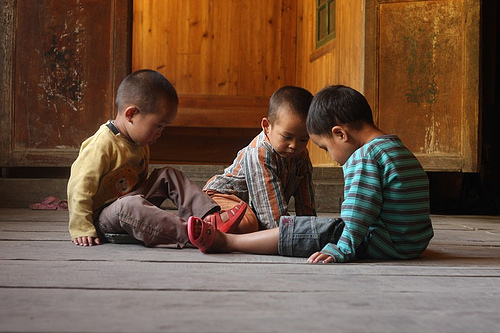I despise battery-operated toys for their loudness and need of constant recharge. In addition to the annoyance of these toys, there may be another reason to ban them from your home:
Children in rural China are falling ill from toxic fumes emitted from the Borui Battery Company’s plant.
 Some rights reserved by Joan Vila
Some rights reserved by Joan Vila
The New York Times reports:
The children, in Anhui Province’s Huaining County, lived across a road from the Borui Battery Company Ltd., which had been ordered closed in August for violating a rule that requires battery factories to be at least 500 meters from residential areas.
The factory continued to operate, and local authorities closed two battery factories in the area on Thursday after elevated lead levels were reported in 228 of 307 children who were tested, according to a government press release.
China Daily reports the battery company is also responsible for lead in the soil, and unfortunately this case is not that unique:
In June and July 2010, four children living near a battery plant in Xinyi city, East China’s Jiangsu province, were found to have excessive lead in their blood. In December 2009, 49 children in Qingyuan city, South China’s Guangdong province, were also found to be suffering from lead poisoning caused by a nearby battery plant.
I don’t know what kind of batteries these plants produce. Whether car batteries or toy batteries, children in China should not suffer the karma of the modern world’s addiction to electronics.
Is it worth the novelty of a singing toothbrush or greeting card to sicken children in any country?
Imagine how helpless parents feel as their children fall ill because of the battery plants. They may have manufacturing jobs, but at what cost to their children’s health?
The New York Times continues:
It was the second instance of factory poisoning to hit Anhui, one of China’s poorest provinces, in recent days. Also on Thursday, a leak of phosgene gas at an Anhui chemical factory poisoned 62 workers. Phosgene is used to make pesticides and fertilizer, among other products.
In China, where both environmental regulation and enforcement can be lax, similar instances of poisoning are not uncommon, especially in rural areas where local officials, under pressure to show economic growth, encourage the development of factories.
We all hold some responsibility when any child falls ill from environmental toxins if we use the products these companies produce, whether directly or indirectly. Although we may avoid plastic, toxic toys to protect our own children, it is important to remember children are most affected at the source of production. Once again, stories like this makes one think twice about purchasing something made in China.
Thank you for posting this. The consequences of mass produced stuff in the population of the producer countries are never reflected in their sales price. Having lived in China and experienced this face-to-face and one life changing moment. This is one of the reasons I started Inca Kids.
Not only kids are getting sick, there is also a whole generation of kids living away from the parents simply because the only work available is in big cities in manufacturing and housing is offered only to the worker that has to work unbelievable hours in awful environments.